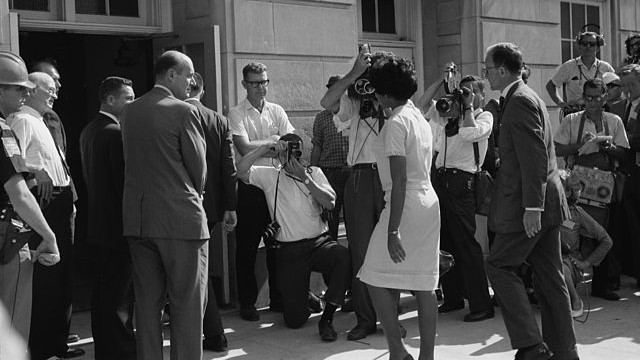
Vivian Malone Jones registering for classes at the University of Alabama on June 11, 1963. Then-Governor George Wallace, flanked by state troopers, physically blocked her entrance until federal marshals intervened. Years later, Jones' future brother-in-law, Eric Holder, would become Attorney General of the United States. (Image: Library of Congress)
The desegregation of America’s schools was one of the crowning achievements of the civil rights movement.
But getting there was a wrenching process that threatened to tear apart the very fabric of our society. In the South, the first African-American kids to attend what had previously been all-white schools were greeted with rioters and death threats. Federal troops were required to assure their safety.
Desegregation’s impact is still felt in our politics; whites’ hostility toward the process was a driving force behind Nixon’s “Southern Strategy,” fueling the kind of dog-whistle politics that remain a defining feature of our political culture.
Now, a new report by Nikole Hannah-Jones for ProPublica shows that with minimal judicial oversight, Southern schools are once again becoming divided by ethnicity. Hannah-Jones writes:
For decades, federal desegregation orders were the potent tool that broke the back of Jim Crow education in the South, helping transform the region’s educational systems into the most integrated in the country.
Federal judges, often facing down death threats and violence, blanketed Southern states with hundreds of court orders that set out specific plans and timetables to ensure the elimination of racial segregation. Federal agencies then aggressively used the authority of the courts to monitor hostile school systems, wielding the power of the 1964 Civil Rights Act to strip federal dollars from districts that refused to desegregate.
The pace of the change wrought by the federal courts was breathtaking. In 1963, about 1 percent of black children in the South attended school with white children. By the early 1970s, the South had been remade — fully 90 percent of black children attended desegregated schools. Court orders proved most successful in the South, but were also used in an attempt to combat de facto segregation in schools across the country, from New York to Michigan to Arizona.
Today, this once-powerful force is in considerable disarray.
A ProPublica examination shows that officials in scores of school districts do not know the status of their desegregation orders, have never read them, or erroneously believe that orders have been ended. In many cases, orders have gone unmonitored, sometimes for decades, by the federal agencies charged with enforcing them.
Read the entire report at ProPublica.
And for an on-the-ground perspective of what school re-segregation looks like, see Nikole Hannah-Jones’ excellent piece in The Atlantic looking at the process in Tuscaloosa, Alabama.

